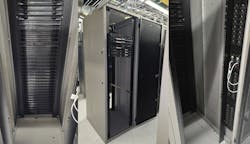In recent years, the data center industry has enjoyed mainstream success. Anyone you talk to understands the concept of a "data center" and can probably reference "that one scene in that one movie where they went into that room with all those computers and lights flash green and red."
Businesses of all sizes and from all types of backgrounds now leverage data center services to provide stability and security to their business-critical technologies, whether they know it or not. It is common for a colocation provider – a business offering space, power, and connectivity in a secure facility built to host business-critical hardware - to talk to a berry farmer one day and a trailer owner-operator the next. One day, it's someone building a new app; the next, it's an IT professional with 40+ years of experience looking to host a legacy system.
Let's be corny – data centers bring businesses together.
Even with the diversity of types of businesses looking to contract with a colocation provider, some trends emerge when clients begin their purchase process. Below, we discuss four main things businesses that need colocation services are looking for and what they do not care about (or so it seems).
Quick, important note: This article focuses on businesses looking for a smaller data center footprint (20kW or less).
Data Center Location Comes First
First things first, location still reigns supreme when discussing colocation services. A potential client has probably contacted you to discuss services based on a specific data center's location. Of course, clients still pick a data center based on the connectivity options. But, mainly, it's all about being close to home. Most clients looking for colocation services want to be close to their home (yes, their home). They will forget about natural disasters in the area and budget restraints from their finance department, and they will focus on the commute to the data center.
Less Power Needs Means Less Options
In recent years, some colocation providers have decided to focus on larger power deals. In other words, some providers now have a minimum power requirement that they will deal with. Those looking to colocate only a few servers may have limited data center options. Clients looking for a specific data center must pay for more space and power, and those not willing to pay for unused space and power may have to go into a different data market altogether.
The Importance of Remote Hand Services
It's just facts – those looking for smaller colocation deals are getting pushed out of markets due to availability and price. Clients who are priced out or unwilling to contract for the minimum power requirement often seek a colocation provider offering free basic remote hand services. Essentially, clients seek services that do not charge extra for reboots, hardware swaps, and connectivity checks.
One last thing to note: yes, everyone wants 24/7 Support.
Explaining Bandwidth and Port Speed
With the increase in power needs, bandwidth needs have also increased. Moving with the times, most colocation providers' standard port is 1Gbps. When discussing bandwidth costs and allocations with colocation providers, most do not use total "data transfer" but instead focus on consistent use. However, clients consistently misunderstand what that means for them.
Most colocation providers will offer plans allowing clients to "commit" to less than 1Gbps of bandwidth. No, this does not mean the colocation provider is "capping" or "limiting" the client's bandwidth use. The client has the full power of a 1Gbps port (i.e., it's burstable to 1Gbps) without paying for the added cost of bandwidth they are not consistently using.
Data Center Specifics - What's Missing?
Unless for a specific use case, most clients do not ask specifics about, frankly, anything related to the data center they plan on moving their infrastructure to. Potential clients fail to ask questions about the construction of the data center (i.e., generators), which providers the network peers with, or the credentials of the staff that manages the facility. There are seldom questions about power redundancy and failovers in place, connectivity options other than the standard option that comes with the service, or how many staff we have in the facility overnight.
Why Does This Matter to the Data Center Industry?
As more businesses work directly with colocation providers, those catering to small clients with flexible, transparent, and support-inclusive packages may carve out a valuable niche. Although there is some misunderstanding around what comes with colocation services, the data center industry can better serve clients by proactively explaining technical offerings and how they affect cost and performance. In short, the importance of small-scale clients in the data center market calls attention to how providers can better align their expectations and constraints with the growing demand.
About the Author

Samantha Walters
With over a decade of experience in technology and telecommunications, Samantha Walters brings a blend of corporate leadership and entrepreneurial innovation to her role as CEO of Colocation America. She previously founded Textbook Balanced, a consulting firm focused on empowering nonprofits and mission-driven businesses through strategic digital marketing. Walters first partnered with Colocation America as a consultant, where her work in brand strategy and market analysis led to a successful collaboration and, ultimately, her recruitment to lead the company. Now at the helm, she is focused on expanding the company's national presence, advancing enterprise and edge services, and championing sustainable innovation.
Colocation America is a premier data center services provider offering colocation, dedicated servers, managed hosting, and network services across 20+ data centers in the United States. With a commitment to reliability, connectivity, and customer service, Colocation America helps businesses stay connected and competitive in a digital-first world.


